Book contents
- Frontmatter
- Contents
- Acknowledgements
- Abbreviations
- Table of cases
- Table of statutes
- Table of international treaties and conventions
- Introduction
- 1 The private security industry uncovered
- 2 State obligations and state responsibility
- 3 The attribution of PMSC conduct to the hiring state
- 4 Obligations of the host state
- 5 Obligations of the hiring state
- 6 Obligations of the home state
- Conclusion
- Bibliography
- Index
- References
1 - The private security industry uncovered
Published online by Cambridge University Press: 05 October 2012
- Frontmatter
- Contents
- Acknowledgements
- Abbreviations
- Table of cases
- Table of statutes
- Table of international treaties and conventions
- Introduction
- 1 The private security industry uncovered
- 2 State obligations and state responsibility
- 3 The attribution of PMSC conduct to the hiring state
- 4 Obligations of the host state
- 5 Obligations of the hiring state
- 6 Obligations of the home state
- Conclusion
- Bibliography
- Index
- References
Summary
Private, profit-driven military actors are almost as old as warfare itself, and were a central component of most wars until the mid-nineteenth century. Throughout history, these individuals triggered various moral and practical objections which ultimately affected their success in the international system. Whilst the modern private security industry is unprecedented in its scale and sophistication, it shares a number of characteristics with past markets for force, and some PMSCs have attracted social stigma similar to that borne by their historical counterparts. An understanding of this historical and normative backdrop provides a key foundation for the analysis of states’ international obligations to control PMSCs in contemporary armed conflict.
- Type
- Chapter
- Information
- Publisher: Cambridge University PressPrint publication year: 2011

